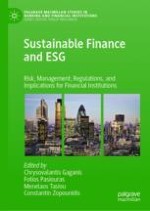In recent years sustainable finance along with Environmental, Social and Governance (ESG) aspects and their implications for financial institutions have attracted the attention of academics and policy makers. The aim of the book is to bring together chapters that discuss the most recent empirical and theoretical evidence in the field, along with policy making and regulatory initiatives. The book covers topics such as the changing role of banks in the financial system, the differences between sustainable banks and traditional banks, ESG and financial performance, bank social responsibility and customer satisfaction, ESG risk management of financial institutions, the politics of climate finance and policy initiatives, and the role of bank regulators. It will be of interest to academics and policymakers working in banking, risk management, sustainable finance and related fields.
